- Home
- Sherwood Smith
Crown Duel
Crown Duel Read online
Table of Contents
Copyright History
PART ONE – CROWN DUEL
PROLOGUE
CHAPTER ONE
CHAPTER TWO
CHAPTER THREE
CHAPTER FOUR
CHAPTER FIVE
CHAPTER SIX
CHAPTER SEVEN
CHAPTER NINE
CHAPTER TEN
CHAPTER ELEVEN
CHAPTER TWELVE
CHAPTER THIRTEEN
CHAPTER FOURTEEN
CHAPTER FIFTEEN
CHAPTER SIXTEEN
CHAPTER SEVENTEEN
CHAPTER EIGHTEEN
CHAPTER NINETEEN
CHAPTER TWENTY
CHAPTER TWENTY-ONE
CHAPTER TWENTY-TWO
PART TWO – COURT DUEL
CHAPTER ONE
CHAPTER TWO
CHAPTER THREE
CHAPTER FOUR
CHAPTER FIVE
CHAPTER SIX
CHAPTER SEVEN
CHAPTER EIGHT
CHAPTER NINE
CHAPTER TEN
CHAPTER ELEVEN
CHAPTER TWELVE
CHAPTER THIRTEEN
CHAPTER FOURTEEN
CHAPTER FIFTEEN
CHAPTER SIXTEEN
CHAPTER SEVENTEEN
CHAPTER EIGHTEEN
CHAPTER NINETEEN
CHAPTER TWENTY
CHAPTER TWENTY-ONE
CHAPTER TWENTY-TWO
CHAPTER TWENTY-THREE
AFTERWORD
VIDANRIC’S BIRTHDAY SURPRISE
INSERTS
ESCAPE
CANDLESTICK
THE EVIDENCE
THE WAGER
RUSSAV AND THE RING
THE WAGER IS WON—AND SO IS THE DUEL
CROWN DUEL
by Sherwood Smith
Copyright History
Crown Duel, Book I copyright © Sherwood Smith, 1997
Court Duel, Book II copyright © Sherwood Smith, 1998
Crown Duel (Books I and II) and “Vidanric’s Birthday Surprise” Firebird edition, copyright © Sherwood Smith, 2002
Crown Duel, e-edition, and “Vidanric’s Inserts” copyright © Sherwood Smith, 2010
This is a work of fiction. Names, characters, places, and incidents either are the product of the author's imagination or used fictitiously, and any resemblance to actual persons, living or dead, business establishments, events, or locales, is entirely coincidental.
To my agent, Valerie Smith
Grateful thanks to Kelly Kawamoto for scaning, to Tamara Meatzie for proofing the e-book edition, and to Pati Nagle for the cover design.
PART ONE – CROWN DUEL
PROLOGUE
I hope any of my descendants reading this know exactly what the Covenant and the Code of War are, but there is always the chance that my story has been copied by the scribes and taken to another land that will consider Remalna distant and its customs strange.
The Covenant has to do with wood—and with Fire Sticks.
We share the land with the Hill Folk. They were here before our people came. One legend has it they were once trees, given human form by some powerful sorcerer. They certainly look more like trees than they do like people. Other stories insist they came through one of the fabled World Gates and settled here because of our trees.
For the trees in our country are unique. We have the common kinds, of course. But high in our mountains we also have the remarkable color trees: huge, long-lived goldenwoods and bluewoods and greenwoods and redwoods, so named because the grains of these trees run rich with gleaming colors.
For centuries Remalna made itself wealthy by cutting them down and selling them to other lands. But our greed nearly caused disaster. The Hill Folk, who were being driven from their homes among the trees, readied themselves to fight. Not in war, because they don’t use weapons. Remalna faced a magical fight that we had no hope of winning. Peace was made only when our people promised that trees would never again be cut down. Wood would be gathered only if it fell. In return, each autumn the Hill Folk would give us Fire Sticks, which would burn by magic until well into the next summer.
Rich or poor, every family within the borders of Remalna—from the king to the poorest street sweeper—gets Fire Sticks, in proportion to their number, not to their riches. Anyone who tries to take Fire Sticks, or to sell them, somehow receives fewer the next year.
The Fire Sticks are given out by magicians from a distant council, who then disappear. There is a simple spell we say to start the fire, and to stop it—Words of Power, we call it, though the spell can’t actually do anything else.
Since the days the Covenant was made, no more color trees have been chopped down. What wood we use is gathered from windfall, and it is used carefully. Our old wooden furniture is treasured.
And so we’ve existed peacefully beside the Hill Folk for many hundred years.
Unfortunately, neighboring countries have not let us exist in peace.
For centuries we fought battles hand-to-hand. Several generations ago someone brought to our continent bows and arrows, which can kill from a distance. These changed the character of battle so much that a Code of War was agreed on by most of the countries. The only weapons permitted would be those held or thrown by hand.
When my story began, these rules had kept us relatively prosperous and in relative peace. I say “relative” because real peace and real prosperity are not possible when you are ruled by a bad king who thinks he is above all the laws.
CHAPTER ONE
The broken shutter in the window creaked a warning. I flung myself across the table to cover my neat piles of papers as a draft of cold wind scoured the room. Dead leaves whispered on the stone floor, and the corners of my moat of papers rustled. Something crashed to the floor behind me. It was the empty soup bowl I’d set that morning on an old, warped three-legged stool and promptly forgotten.
The rotted blue hanging in the doorway billowed, then rippled into quiescence. The whispers and rattles in the room stilled. I sat up and glared at the bowl. Could it be mended? I knew Julen would be angry with me. Julen was the blacksmith’s sister, and the mother of my friend Oria. After my mother died she looked after me, and she had of late taken over cooking for us. Crockery was hard to come by these days.
I reached for the pieces, my blanket ripped—and cold leaked up my arm.
I sat back on my cushion, staring down in dismay at the huge tear at my elbow. I did not look forward to the darning task ahead—but I knew that Julen would give me one of those glances she was so good at and calmly say that practicing my darning would teach me patience.
“Mel?”
The voice was Bran’s. He tapped outside the door, then lifted the hanging. “Meliara, it’s time to go see Papa.”
Ordinarily Branaric never called me Meliara, but I was too distracted to notice right then.
“Bran!” I leaped to my feet. “I did it—just finished! Look!” I pulled him into the room, which had once been a kind of parlor for the servants, during the days when the castle had had plenty of servants. Pointing proudly at the table, I said, “I know how to cheer Papa, Bran. I’ve found us a way to pay this year’s taxes! It’s taken me two days, but I really believe I have it. It’ll buy us another year—you know we need another year. Look,” I babbled, stooping down to tap each pile of papers. “Every village, every town in Tlanth, and what it has, what it owes, and what it needs. Not counting the gold we set aside for our Denlieff mercenaries—”
“Mel.”
I looked up, my mouth still moving, but the stricken look in Bran’s eyes sent all the plans from my mind as if that cold wind had swept them into the shadowy corners with the dead leaves.
Branaric gazed at me, his f
ace unfamiliar. My brother always smiled—with his mouth, his eyes, even the little quirk in his straight brows. Julen once said that he’d been born smiling, and he’d probably die the same. There was no smile now.
“Papa?” I asked, my throat constricting.
He jerked his chin down. “Wants us both. We’d better be quick.”
I batted aside the door hanging and ran out. My bare feet slapped the cold stone flooring, and I shivered and yanked my blanket closer. I felt the old wool give and the hole at my elbow widened as I dashed past the warmth of the kitchen and up the tower stairs.
Bran was just behind me. Neither of us spoke as we toiled round and round, up to the little room at the top of the tallest tower of our castle. The cold was bitter, promising a fierce winter. As I ran I pulled my blanket tighter, tucking the ends through the rope I used as a sash.
The fourth round brought us to Papa’s room. He was completely alone—the villagers who had taken turns sitting with him had been sent away—and the windows were wide open. Despite two of our three precious Fire Sticks burning brightly in the fireplace and on a makeshift brazier near the bed, the room was shockingly cold.
“Papa—” I cried, flinging myself down by the high, narrow bed. “It’s not good for you to be so cold when you’re sick—”
“Leave it, child.” His voice was just a whisper. “I want to die hearing the windharps. Already the Hill Folk mourn me…”
I heard it then, a faint, steady humming on the wintry breeze, carried down from the distant mountain peaks. The sound was eerie but strangely calming, and I turned away from the window, the cold air forgotten.
“Papa—” That was Bran.
Our father’s gray beard stirred as he turned his head. He gave Bran a weak, tired smile, no more than a twitching of the lips, and it wrenched at my heart. “Be not sad, my boy. Be pleased.” Papa spoke with effort. “The Hill Folk honor me. All my life I have kept the Covenant, and I shall die keeping it. They know it, and they send their music to guide my spirit from the mortal realm.”
I took his hand, which felt cold and dry. Pressing it against my cheek, I said, “But Papa, you are not to worry about Greedy Galdran’s tax demand. I’ve found a way to pay it—I just finished!”
The gnarled fingers briefly gripped my hand. “It’s no longer time for taxes, child. It’s time to go to war. Galdran’s demand was not meant to be fulfilled. It was an excuse. His cousin wants our lands.”
“But we’re not ready,” I protested numbly. “Just one more year—” I heard the scrape of a shoe behind me, and Bran touched my shoulder.
Papa tried to smile, but we could see the effort it took. “Meliara. Branaric and Khesot know the time is come, but that is what they are trained for. Indeed, daughter, they are ready because of the help you have given them this past year.”
I fell silent. His desperate gaze shifted from me to my brother and then back as he spoke with increasing difficulty.
“Remember, my children…although your mother chose to adopt into my family, she was a Calahanras…the last of the very finest royal house ever to rule Remalna. If she had wanted, she could have raised her banner, and half the kingdom would have risen, gladly, in her name. You two are half Calahanras. You have her wit, and her brains. You can take Remalna, and you will be better rulers than any Merindar ever was.”
I stared at my father, not knowing what to say. To think. It was the first time he had mentioned our mother since that horrible day, nearly ten years ago, when the news had come that she had died so suddenly and mysteriously while on a journey to the capital, Remalna-city.
“Promise me,” he said, struggling up on one elbow. His breath wheezed in and out, and his skin was blotchy with the effort, but his voice was strong. “Promise me!…You will…fight Galdran…protect Tlanth…and the Covenant…” He slumped, fighting for breath.
“Papa,” I quavered.
Bran reached for the frail old hand. “Papa, please. Rest. Be easy—”
“Promise!” He gripped our hands, pulling us toward him. “You must…promise me…”
“I promise,” I said quickly.
“And I,” Branaric said. “Now, Papa, you must try to rest.”
“It’s too late for…” His eyes closed, and his fingers loosened from mine, and wandered without purpose over the bedclothes. “Khesot…You and Khesot, Branaric…as soon as our hirelings get here from Denlieff, then you attack. Surprise…will carry you a long way.”
Bran jerked his chin up. “Just as you say, Papa.”
“And trust Azmus.” Papa trembled with the effort it took to speak clearly. “He was your mother’s liegeman…If—if he had been with her on that cursed trip, she would be with us now…Listen to him. I didn’t, once, and…” Grief wracked his face, grief and pain.
“We understand, Papa,” Bran said quickly. I couldn’t talk—my throat hurt too much.
Our father gave a long sigh of relief, sinking into his pillows. “You’re a good boy, Branaric. No, a man now…a man these four years. And Meliara, almost grown…” He turned his head to look at me. Horror seized my wits when I saw the sheen of tears in his eyes. “Meliara, so like your mother. I wronged you, my daughter. Please forgive me for neglecting you…”
Neglect? I thought of the years that Bran had reluctantly gone up to the tower to wrestle with musty old learning-books while I ran free with Oria and the other village children and, in summers, roamed the high mountains to dance with the Hill Folk under the full moon. My father had always seemed a distant, preoccupied man, and after Mother’s death he had become even more distant. It was her I’d missed, and still missed.
I sucked in my breath, trying hard not to cry. “But I was happy, Papa,” I said. “It wasn’t neglect, it was freedom.”
My father smiled. The tears shone in the furrows beside his eyes. “Free…” I don’t know if he was repeating what I said or beginning a new thought; whichever, it was destined to remain unfinished, at least in this world.
He fell silent, his hands reaching again. This time when we each gripped his fingers, there was no response. His breath slowed, then stopped.
Branaric stood helplessly, staring at the still figure in the bed. Feeling numb—unreal—I took Papa’s thin hands, which were still warm, and laid them gently across his breast. Then I turned to my brother. “There’s nothing we can do now, except gather the villagers…” And prepare the funeral fires. I couldn’t say the words.
Bran’s chest heaved in a sob, and he pressed the heels of his palms to his eyes. His grief dissolved my numbness, and I began to weep.
Bran opened his arms and I cast myself into them, and we stood there for a long time, crying together while the cold wind swirled round us and the distant windharps of the Hill Folk hummed.
It was Bran who pulled away. He gripped my shoulders. “Mel, we have to keep that promise. Both of us. But you don’t know—” He shook his head and knuckled his eyes. “Together. I know I’m the oldest, and Papa named me the heir, but I promise right now, we’ll share the title. Half and half, you and me, even if we disagree—which I hope won’t happen. All we have now is this old castle, and the county’s people to protect—and each other.”
“I don’t want to be a countess,” I said, sniffling. “Look at me! Wearing a horse blanket and running about with bare feet! I don’t know the first thing about being a countess.”
“You’re not going to Court,” Bran said. “You’re going to war. And about that”—he winced—”about that, I think you know just about as much as I do.”
“What do you mean?”
Bran sidled a glance at Papa’s body. “I know it’s stupid. He can’t hear us. But I don’t feel right about telling you these things up here. Let’s stop the fires and go downstairs.”
We each moved to one of the blazes and said the Words of Power over a Fire Stick. The fires flickered out with a snap. I picked up my Stick, which was still warm; I wrapped my chilled fingers around it and waited as Bran picked his
up, with a last glance at the still figure on the bed.
“Have you been keeping secrets from Papa?” I asked, full of foreboding, as we started down the long spiral.
“Had to.” Bran took a deep, unsteady breath. “He aged ten years when Mama was killed, and every year since, he’s seemed to add another ten. Until this year. Of late each day seems to have added ten.”
“Better tell me, then,” I said.
“There’s no way to make this easy,” Bran warned as we reached the ground floor again. “First you should know why Papa wanted us to go on the attack right away: Azmus has proof that the king, and his cousin, plan to break the Covenant. It’s a letter that Debegri wrote. It’s full of fancy language, but what it means is he’s offering our colorwoods for sale outside our kingdom. For gold.”
“What about the Hill Folk? The woods are theirs! It’s been that way for centuries!”
Branaric shook his head slowly. “Not if Debegri gets his way—and Azmus knows the king is behind this scheme, because royal messengers were sent to carry the letter.”
“But we haven’t heard from those warrior captains we hired—”
“Now it’s time for you to hear the secret I kept from Papa.” Bran’s expression hardened. “Those mercenaries from Denlieff took our money and vanished.”
I whirled around to face him. “What? Do we know that for certain? Could they have been delayed—or ambushed—by Galdran?”
Bran shrugged. “I don’t know. The only reliable informant we could send to find out would be Azmus.”
“But isn’t he still in the capital with Papa’s letter to the king?”
“Awaiting the signal to deliver it and disperse copies through all the Court, just as Papa ordered. But as to the mercenaries from Denlieff, both our messengers have returned and reported that the commander isn’t to be found. No one’s even heard of him or his troop.” Bran added sourly, “I thought all along this was as risky as trusting skunks not to smell.”

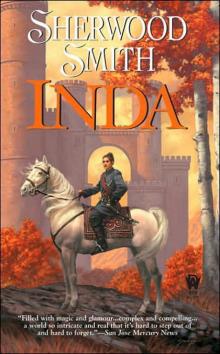 Inda
Inda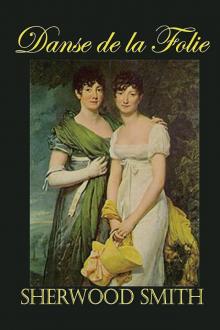 Danse De La Folie
Danse De La Folie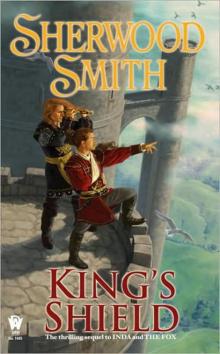 King's Shield
King's Shield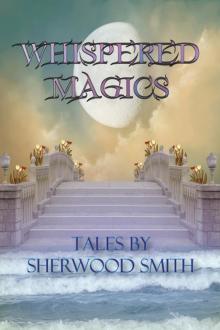 Whispered Magics
Whispered Magics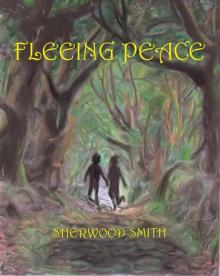 Fleeing Peace
Fleeing Peace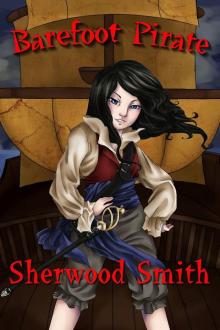 Barefoot Pirate
Barefoot Pirate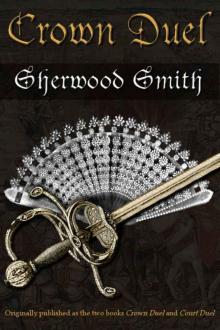 Crown Duel
Crown Duel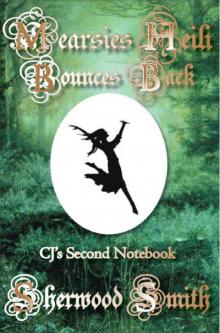 Mearsies Heili Bounces Back
Mearsies Heili Bounces Back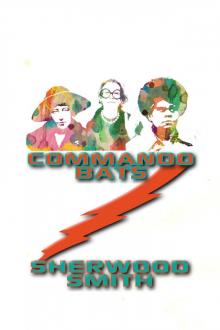 Commando Bats
Commando Bats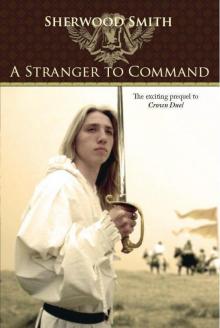 A Stranger to Command
A Stranger to Command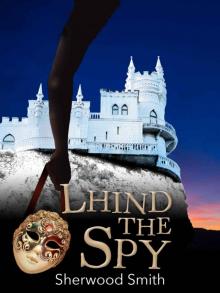 Lhind the Spy
Lhind the Spy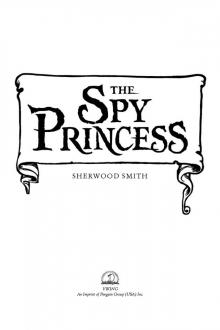 The Spy Princess
The Spy Princess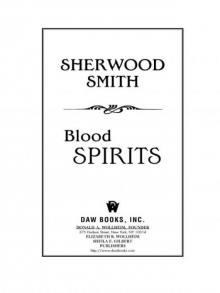 Blood Spirits
Blood Spirits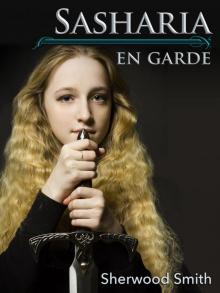 Sasharia en Garde
Sasharia en Garde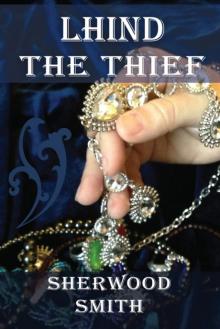 Lhind the Thief
Lhind the Thief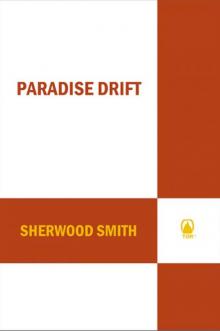 Paradise Drift
Paradise Drift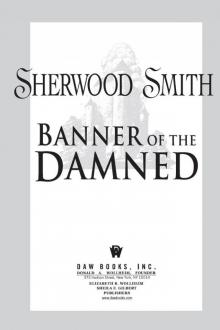 Banner of the Damned
Banner of the Damned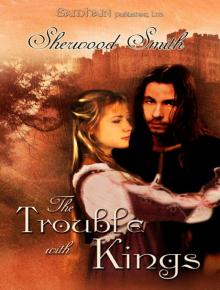 The Trouble With Kings
The Trouble With Kings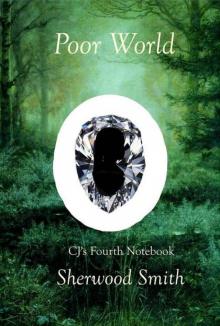 Poor World
Poor World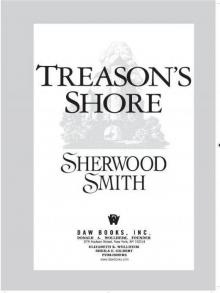 Treason's Shore
Treason's Shore Wren Journeymage
Wren Journeymage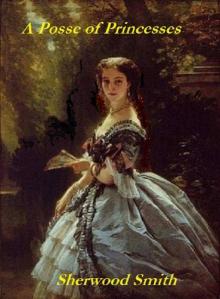 A Posse of Princesses
A Posse of Princesses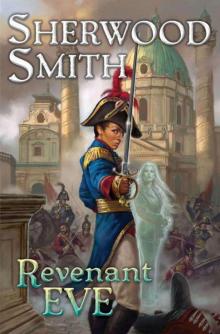 Revenant Eve
Revenant Eve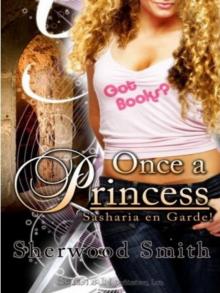 Once a Princess
Once a Princess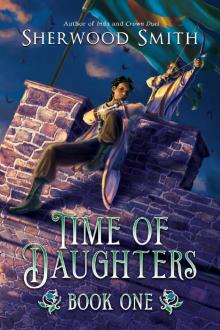 Time of Daughters I
Time of Daughters I Rondo Allegro
Rondo Allegro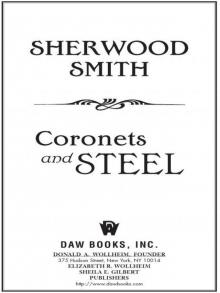 Coronets and Steel
Coronets and Steel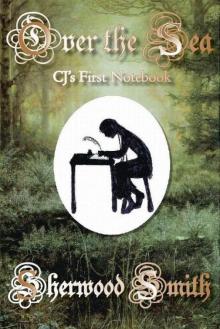 Over the Sea
Over the Sea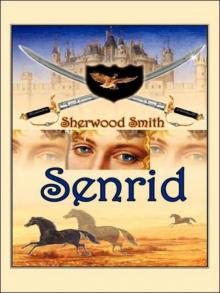 Senrid
Senrid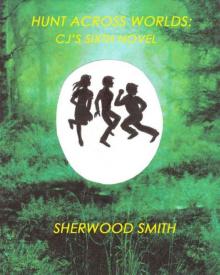 Hunt Across Worlds
Hunt Across Worlds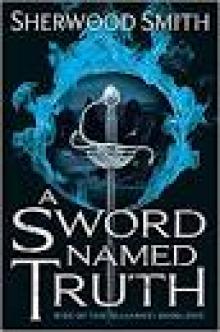 A Sword Named Truth
A Sword Named Truth The Fox
The Fox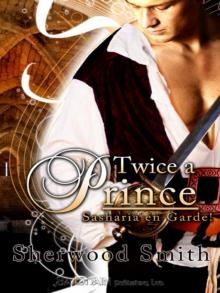 Twice a Prince
Twice a Prince Fair Winds and Homeward Sail: Sophy Croft's Story
Fair Winds and Homeward Sail: Sophy Croft's Story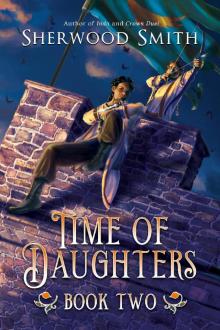 Time of Daughters II
Time of Daughters II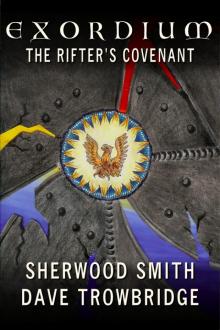 The Rifter's Covenant
The Rifter's Covenant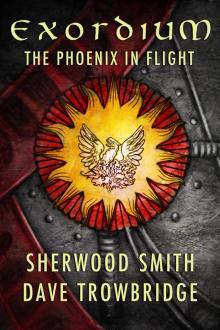 The Phoenix in Flight
The Phoenix in Flight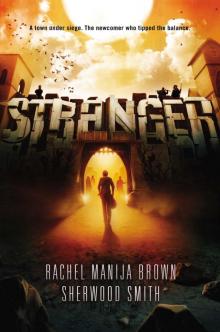 Stranger
Stranger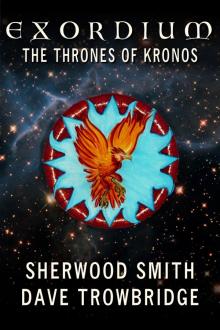 The Thrones of Kronos
The Thrones of Kronos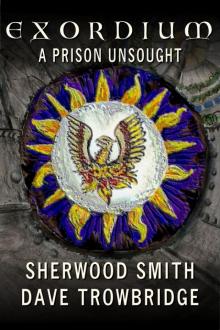 A Prison Unsought
A Prison Unsought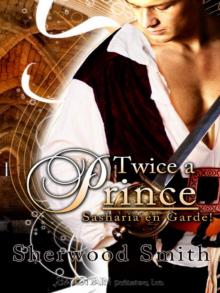 Twice a Prince: Sasharia En Garde Book 2
Twice a Prince: Sasharia En Garde Book 2